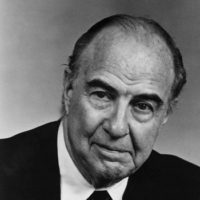
Vincent P. Dole
The Rockefeller University
For postulating the physiological basis of narcotic addiction and for developing methadone treatment for heroin addiction.
In 1964, Dr. Dole, a distinguished authority on human metabolism and the treatment of obesity, recognized heroin addiction as a growing public health problem that could not be solved by law enforcement, moralistic arguments, or traditional psychiatry. Making a completely new professional commitment, he began studying the physiological nature of chemical dependency.
Using a synthetic, long-acting opiate known as methadone, he discovered that carefully titrated doses of methadone could block an addict’s craving for heroin during withdrawal, and that long-term methadone treatment provided a way for the addict to escape from the devastating cycle of heroin addiction.
He postulated that methadone blocked the sites in the brain where heroin would ordinarily act. He reasoned that the normal brain must include these receptor sites for normal neurotransmitter molecules. Years before technology was devised to study these sites, now known as endorphin receptors, Dr. Dole conceived a laboratory protocol for their detection, and mathematically determined the number of endorphin receptors present in the brain.
With his wife and colleague, the late Marie Nyswander, Dr. Dole proved that heroin addicts could be regarded as patients with a chronic metabolic condition. When addiction is treated medically, antisocial and criminal behavior can be eliminated, and lives and resources can be saved. Methadone maintenance alone restores half those treated to useful life; when social and psychological support are supplied, the rate of success increases significantly.
To Dr. Dole, for postulating the physiological basis of narcotic addiction and developing an effective method for its medical management, this 1988 Albert Lasker Clinical Medical Research Award is given.
